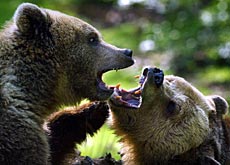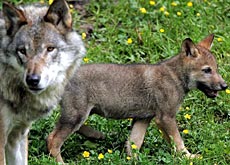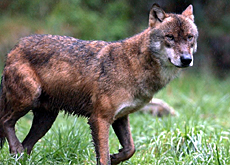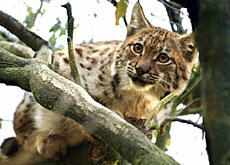Brown bears knock on Switzerland’s door

After centuries of being hunted to the verge of extinction, the brown bear is making a comeback in Europe and could soon appear in Switzerland.
A study commissioned by the environmental organisation, WWF, shows bear populations over the border in northern Italy have recovered in recent years and are expected to begin roaming further afield.
The nearest brown bear population is reckoned to be between 38 and 87 kilometres away from Switzerland in the Trentino region.
There are three corridors leading from Trentino to the southern Swiss valleys, where they could live without being disturbed by humans.
Suitable habitats have been identified in the Engadine and the territories stretching from northern Graubünden through Glarus down to central Switzerland.
Bloody history
Wild bears were shot to extinction in Switzerland about a hundred years ago, and it took until the end of the 1970s for Europe to recognise that endangered species such as bears needed protection, if they were to survive at all.
Switzerland was among the signatories of the 1979 Bern Convention, the first European treaty for nature protection.
In 1999 member countries pooled their efforts to save the small bear colony in Trentino, which was under threat from inbreeding.
The WWF imported ten bears from Austria and Slovenia, bringing the number of Trentino bears to 14. These animals have started to reproduce and the young cubs are expected to cross the Swiss border in search of fresh hunting grounds.
Hungry carnivores
It remains to be seen whether the Swiss will welcome the return of yet another predator.
Wolves – another protected species – have killed dozens of sheep since they crossed into Switzerland from Italy.
The lynx was reintroduced into Switzerland in the 1970s, and populations are doing well. But the big cats, which are also protected, are killed every year by hunters, who claim they prey on sheep.
Farmers are entitled to compensation for the loss of livestock, if they can prove that wolves or lynx are to blame.
Christoph Jäggi from the Swiss environment agency says the same rules are likely to apply to bears.
Brown bears have been known to sift through domestic rubbish bins, empty fishponds, destroy beehives in their search for honey and occasionally attack farm animals.
Jäggi believes that the same measures put in place to protect livestock from other predators can be applied to bears.
“In Ticino, Graubünden and Valais, improved fencing and the introduction of sheep dogs and donkeys are helping to safeguard herds,” he told swissinfo.
“Fences can also keep bears out of orchards, but there may be cases where beehives need to be repositioned”.
Tourist Attraction
The arrival of the brown bear in Switzerland could be a boon for tourism, with visitors thronging to follow the bear trail.
“Bears are welcome, as long as the appropriate safety measures are introduced to protect tourists,” said Swiss Tourism spokesperson Silvia de Vito.
European brown bears are shy creatures, naturally afraid of humans and less aggressive than America’s grizzly bears. But they can become dangerous if caught by surprise or separated from their young cubs.
If brown bears do return to the Swiss Alps, the WWF intends to launch an information campaign to advise tourists what to do if they come face to face with the animals.
“In South Tyrol hikers are advised to carry tiny bells to ward away the bears. Simple measures such as these are very effective,” said WWF Switzerland spokesman Richard Lehner.
swissinfo, Julie Hunt in Bern
Brown bears live for up to 25 years in the wild.
Females bear 2-3 cubs every two years.
They were once widespread in Europe, but are now endangered due to loss of habitat.
The highest concentration of brown bears is in Romania.

In compliance with the JTI standards
More: SWI swissinfo.ch certified by the Journalism Trust Initiative




You can find an overview of ongoing debates with our journalists here. Please join us!
If you want to start a conversation about a topic raised in this article or want to report factual errors, email us at english@swissinfo.ch.